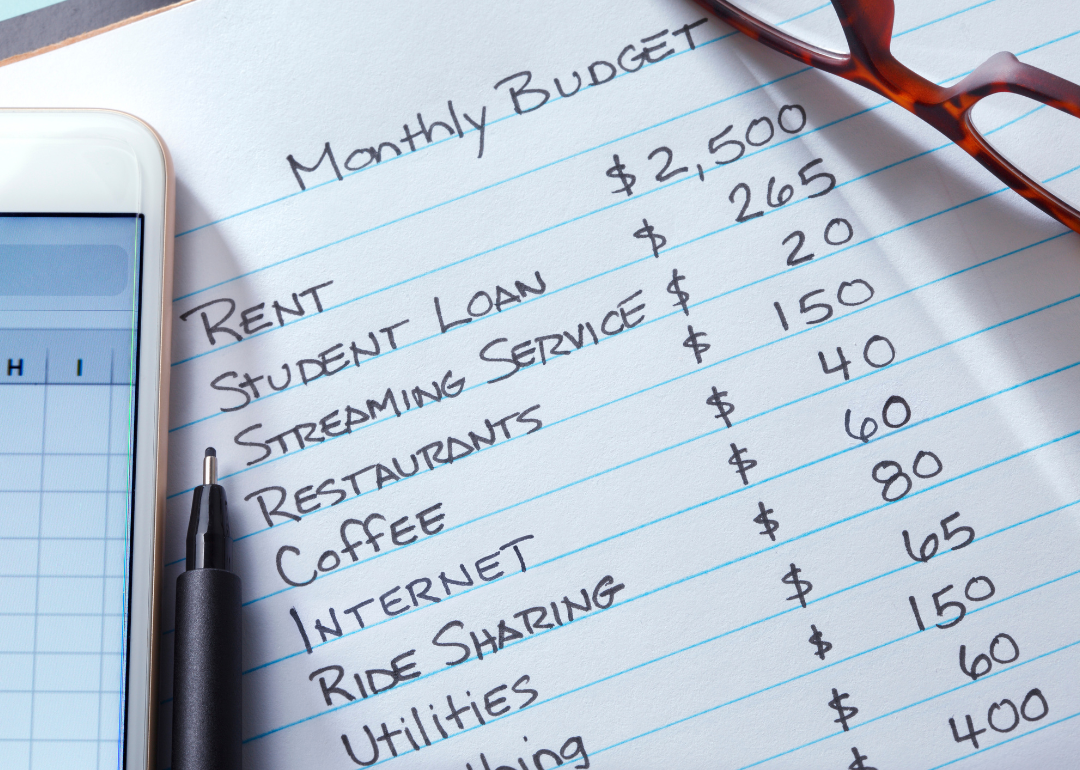
6 ways to strengthen your retirement savings this year
6 ways to strengthen your retirement savings this year
Coming out of one of the most volatile years on record for the stock market, investors are looking for ways to take back some control over their investments—especially the savings they're putting away for retirement.
Stacker analyzed common retirement savings best practices from sources including the Federal Deposit Insurance Corp. and the Securities and Exchange Commission, along with reports from reputable news and financial institutions, so that you don't have to.
Think of these suggestions as a kind of spring cleaning for your finances. Much like other important things in life, your savings need occasional maintenance to ensure they're working as hard as possible to fund the future you hope for after retirement.

Assess and update your net worth and budget
It's commonly said that acting on emotions is a terrible way to make important financial decisions, and that recommendation extends to if you feel you've stockpiled enough savings. Instead of going on how secure you feel, sit down and go over all the numbers to give an accurate calculation of your net worth.
Calculating your net worth isn't just about looking at the bottom line on your financial statements. A true net worth calculation means totaling all your assets (including, crucially, your home) and subtracting liabilities such as student loans, credit card debt, and mortgages.
By doing the work to figure out this number, as well as updating it from time to time, you will have a much clearer picture of where you currently stand financially. That number can also color how you set your retirement goals, as well as how you plan to achieve them.
Seeing a concrete figure for your net worth also helps to inform what a responsible day-to-day budget should look like. If you're falling behind on your goals, it'd be wise to adjust how you spend your income.

Prioritize paying down debt
Another benefit to calculating your net worth is that you gain a clear sense of how much debt you're carrying. Socking away $1 million in the bank sounds nice, but that seven-figure bank balance is nothing more than a mirage if you owe $2 million on credit cards. It can be difficult to plan strategically for retirement if you are carrying too much debt—facing a mountain of bills can also tempt you to dip into retirement savings and delay building your nest egg.
One strategy popularized by financial adviser Dave Ramsey is the "debt snowball" method. With this method, you continue to pay the minimum required balance on all your debts, but any cash you can set aside is applied to the debt with the lowest balance. Once that debt is paid, you apply all the money spent on the cleared debt to the next-lowest amount.
Simply paying down debt can go a long way toward improving your financial situation, but not all debt is the same. Estimates vary, but an August 2022 report from McKinsey says the average yearly return from U.S. stock market investments from 1800 to today is 6.5% to 7%. That suggests it may be better to focus a debt snowball on loans with interest rates above 7%.

Cut unnecessary subscription expenses
Many tech products aim to provide a "seamless" experience, meaning they aim to make it as easy as possible to sign up for a service or purchase a product. Streaming services have made it exceptionally easy to click a couple of buttons and sign up for a new service so you can binge-watch whatever you're fascinated by next.
But a few months later, it's equally easy to forget you agreed to ongoing payments in exchange for seeing just one season of some now-forgotten series. Many subscription service fees seem like small monthly amounts, but when bundled together, they could be taking a serious bite out of your income.
One writer found that by canceling all the services she didn't use on a weekly basis, she lowered her monthly expenses by over $450. If she put all that money into a stock market index fund and never touched it again, she could end up with over $41,000 for retirement in 30 years.

Top up your emergency fund
Some important details of your financial life do not necessarily appear in your net worth calculation, like liquidity.
You might be worth $300,000, but if all that money is tied up in the value of your home, you'll be hard-pressed to find the cash if an expensive, urgent situation comes your way. The money's not in your bank account, and getting access to it—like through a home equity line of credit—comes with its own costs and time delays.
Financial advisers suggest you keep an emergency cash fund available for unexpected expenses. The traditional advice is to have three to six months' worth of expenses saved in that account. So if your expenses have gone up, or you're at the lower end of that range, consider increasing your contributions to your rainy day stash. Having this financial cushion will help prepare you for unforeseen crises so you don't have to turn to retirement savings for emergency cash.

Max out or increase your 401(k) contribution
A well-known benefit of a 401(k) program is that the money contributed from your paycheck isn't taxed as income until you withdraw it after age 59 ½.
So, if you get paid $40,000 yearly after taxes and contribute $5,000 of that for your 401(k), you're only on the hook to pay taxes on the remaining $35,000 this year. The plans also let investors contribute toward their retirements automatically via direct deduction from their paychecks. That way, the money is squirreled away before it hits your bank account, so you won't have to think about it—or be tempted to spend it.
Perhaps the biggest bonus to 401(k) plans is that some full-time employers offer matches to employee contributions, at least up to a certain level. But nearly a quarter of all employees eligible for that free money from their employer don't set aside enough money to maximize the employer contribution.
In December 2022, President Biden signed an appropriations bill into law that includes a set of provisions—known as SECURE 2.0—that will impact retirement savings plans. One of the provisions requires employers to automatically enroll workers into new company retirement plans at no lower than a 3% rate starting in 2025.
Take some time this year to review how your plan is set up. If you're expecting a raise, consider applying most or all of it toward your retirement savings. You may not even notice a missing increase in your regular paycheck, and you'll be setting yourself up for a more relaxing retirement.

Resolve to advance an existing savings goal or start a new one
Saving for retirement, like many personal goals, is not a competition against anyone else. But, like other goals, sometimes you need to stretch your horizons to continue to grow. It's possible that your needs in retirement may be considerably less than you initially planned, especially if you've downsized your home or have adjusted your aspirations to be a bit more frugal.
In other cases, many experience "lifestyle creep"—an endless cycle of buying things you don't need, usually for more than you need to pay, just to keep up appearances. People often find that if they've steadily upgraded their lifestyle habits over the years, they'll need even more money in retirement than they initially planned. If you realize your expenses in retirement might be higher, consider an increase in how much you set aside from each check toward retirement goals. Keeping your future needs in mind can lead to financially wise decisions today.



